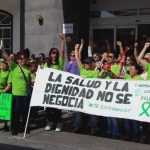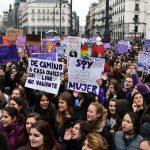THE BLOSSOMING OF PODEMOS IN SPAIN AND THE CRISIS OF CAPITALISM
From the Posadistas Hoy – 23.03.2015 –
The political situation in Europe evidences important changes in the relations of forces. This shows in the mobilisations in France, the public sector strikes in Britain, the demonstrations in Italy & Portugal. It shows in the fact that Syriza won the elections in Greece and that Podemos gathers strength in Spain. The working class and the broad masses reject the crushing load piled on their shoulders by the impotence and the incompetence of the capitalist system. Capitalism cannot cope with people or solve their problems.
New political alternatives are appearing because the institutional organisations of the Left and the leaderships of the big trade unions lose their authority. These alternatives reflect the growing maturity of people, and their search for new ways to get out of our situation of emergency.
People do not accept the austerity measures thrown at them by the EU, the IMF and the European Central Bank (Troika).
From 2008 onwards, the crisis delivered huge blows to the workers movement, as well as to the most vulnerable persons, like the immigrants, the young, the women and all those with special needs. The organisations of these sectors took a direct hit too. Many are those now without jobs, houses, social rights and any quality of life.
The pacts signed between Banks, investor funds and the multinationals caught the trade unions and the Left-wing organisations unprepared, particularly in the EU. Rubbish-rated portfolios sent premiums rocketing up, along with sky-high levels of national debts. These factors were then used to declare a state of general crisis, behind which the true aim is to privatise the public services, emasculate the labour laws and paralyse the trade unions. This ends up now with the confiscation of the rights which the workers won after years of struggles and sacrifices.
At the other end of this disaster for the working class, capitalism has never stashed away so much floating money in its finance paradises. It does not invest these funds in any infrastructure, public service or productive apparatus. It uses these for speculative purposes instead. And it uses these to attack countries with weak currencies, like Argentina, where indebtedness is used as a weapon to stop countries challenging the neo-liberal economic model. Masses of capital move rapidly from one end of the planet to the other, getting invested in armaments and wars, as well as drugs’ and people’s trafficking.
Due to the debility of the trade union leaderships, this caused in people an initial sense of shock and doubt. But in countries like Greece, Portugal and Spain, the workers were soon on their feet against the crisis and the cuts. There came strikes, mobilisations, struggles and general strikes. Enterprises closed down, wages lost their buying power and human & trade union rights were slashed – but there came a reanimation. In the health sector, the “Marea Blanca” in Madrid[1] managed to halt privatisations. The fight at the Gamonal barrio – a suburb of Burgos – was victorious[2]. In Madrid, in Lugo and in other towns, the waste collectors won their demands. At Coca Cola and Panrico[3] the workers proved able to fight for jobs, wages, and trade union organisation too.

The “Mareas” are presently flooding the streets in defence of the public services. In the suburbs, people organise against the arrogance and the speculation. The Mortgage Victims Platform (PAH) stops dozens of evictions[4]. The casual workers of Andalucia and Extremadura are fighting back: they occupy lands and protest their misery and hunger. On 15 May 2011, strikers, pensioners, young people and many others had occupied the squares in many towns. This had started the 15 May movement of ‘Indignados’ – the ‘15M’. Now, the 15M women’s collectives against gender violence are being supported by victims of the restrictions on the Dependency Law[5]. The immigrants stripped of their rights and the generally downtrodden stand up against this austerity imposed by the Troika, with the complicity of the Rajoy’s[6] government.
The “Dignity March”[7] has a programme. It demands “Bread, Work and Roof” for all. Plus the non-repayment of the State’s debt. This 23 March, it gathered more than one million persons in Madrid. People poured in from everywhere with their recriminations, their demands and their repudiation of the government’s cuts and austerity. They denounced this policy imposed from the European Union – a policy that blames people for the crisis whilst the banks and big enterprises amass bigger profits by the cartload. Down with such a policy! It does not even reduce unemployment. It just makes employment more precarious. And it strikes at the defenceless, like the immigrant; it raises infant malnutrition. The working class’ families are left dispossessed and offered no alternative.
The 23.3.15 “Dignity March” has unified all the struggles. It marked a moment of significant change in force relations that make it possible to confront the Right-wing, restrain it and hold it back. This comes on the heels of a process that saw the irruption of Podemos on the political scene. Podemos goes back to the European elections when the major political parties had nothing to show except their crisis. The abdication of king Juan Carlos[8] came with an enveloping wind of general contempt for the political class. These all are the signs of a maturing process.
The 15M, the struggles in the enterprises, the mobilisations of the “Mareas” and that of all the social sectors – all this motivates the youth and the people at large. They reject the money adjustments that do so much damage, particularly to the most vulnerable.
It is in this climate of rebellion and active participation that Podemos was created and developed as a new movement.
It is important to analyse how Podemos was formed, and the political circumstances that sustained its growth. In Feb 2014, a group of graduates in Political Science at the Madrid Complutense University started months of meetings and discussions with activists, ex-militants of Left-wing parties, social movements and other sectors. They decided to draft a political project: Podemos. The aim was to break out of the Transition Accords[9], regenerate the democratic functioning of the institutions, eliminate corruption, defend the social rights of the population and protect the public services.
The leadership of Podemos proposes the creation of a Public Bank for families and the small-to-medium enterprises. It insists on a guaranteed minimum wage, no sackings, and dignified housing for the most marginalised sectors of society.
Podemos associations, or ‘circles’, have become strong in most suburbs, towns and villages. They operate on the basis of assemblies where the delegates are elected and documents are debated. The debates relate to political and organisational questions, with a view to improving the programmes and the functions of the ‘circles’.
The circles emerged from a multitude of actions which eventually managed to give people a voice in the European elections. From that moment onwards, they spread throughout the country. Craving to participate, and feeling that this was answering their needs, people joined the circles massively and became incorporated. This is how they support Podemos now, and its functioning.
The growth of Podemos has been such that it can envisage the possibility of standing as alternative to the right wing Partido Popular, the PP. The last evaluations in direct voting intentions did not quite put Podemos in absolute lead, but well ahead of the PP. Faced with the corruption, the crisis and the inability of the traditional parties, people turn away from them. The collapse of support for the PP and the Socialist Party (PSOE) fairly terminates the bi-partisan structure that ruled over Spain since the Transition.
This year (2015) is an electoral one because the general elections are due in December. Podemos is elaborating its economic responses. It will defend equal pay for women. It will stress the importance of improving social protection, and the care for all dependent persons. It wants child benefit to be universal, and for every child. It wants as much recognition for fathers’ rights as for mothers’. And it wants workers’ rights granted to domestic employees. The present system generates discriminations that leave the most vulnerable persons without any insurance protection whatever.
The Podemos’ leader, Pablo Iglesias[10], makes the very important proposal of a referendum to decide whether to stay or not in Nato. In this matter, no other political organisation puts the Rajoy government so clearly on the spot. The Rajoy government implicates Spain in all manner of military adventures, whilst cutting back on such things as health and education.
Podemos may possibly reach government singly, or through a coalition alliance. Hence the experience of Syriza in Greece must be appraised. Syriza won the elections, but it must now deal with the pressure of Germany and the European Central Bank. These are not about to allow the implementation of anti-crisis and anti-austerity programmes, for these are programmes of social transformation. As such, they are going to need the mobilisation of the working class, of the social movements, of all the exploited. Nothing short of mobilisation can cope with this situation of capitalist subjugation.
There are important struggles and mobilisations throughout Spain. Large sectors of society are starting political activities that question the capitalist system and its institutions. This opens new political vistas. Now, what is necessary is the creation of cadres – that is to say teams of leaders – in the trade union field, in the countryside, amongst the students and in the social movements. After the general elections (due in December), Podemos and those who reach government will have to restructure the economy. For the economy is devastated by debts, closures, sackings – and the PP-induced cuts so damaging to health and education. The need to get out of Nato will confront the new leaders, and they will need to cut military spending. They will have to deal also with the crisis and corruption that preserve the Franco-ist modes of army functioning.
A road map is required for the resolution of urgent problems like the poverty and infant malnutrition striking millions. Rapid responses are needed to see to the basic needs of a population made to pay for a crisis it was never responsible for.
[1] This translates as “White Tide”. Protest tides – or ‘Mareas’ – exist in every social field in Spain. The White Marea opposes the cuts in public health. The Yellow Marea opposes library closures. The Blue one defends the public ownership of water. The Orange defends the social services, the Black specialises against the cuts, and the Green defends public education. At the end of 2012, the local authorities in Madrid started the privatisation of 6 hospitals and 27 Health Centres. On 9 Dec 2012, a White Tide formed around the hospitals. On 17 Feb 2013, the Tide had become national. Now, it pulses new and deepening waves throughout the country at regular intervals.
[2] On 18 Jan 2014, there were 8 days of protests against the creation of a Boulevard in Victoria Street, Burgos. The plan was to bulldoze car-parks and open spaces at the cost of €8 million. Associations of neighbours formed, mobilised and encircled the works, as this was unnecessary work and public expense. Police fought people with truncheons. Many were arrested and hurt, but the work stopped.
[3] Coca Cola: On 25 Jan 2014, workers started to strike in bottling plants against partial closures and the elimination of some 800 jobs. On 13 June 2014, the High Court declared in favour of the workers. Although the Unions made concessions, the plants were forced to re-employ most of the sacked workers. Pan Rico is a most famous national bakery. In Nov 2013, it sought to sack almost 2,000 workers but was made to retreat a great deal by the workers’ mobilisations.
[4] The PAH organises persons affected by unsustainable mortgages due to job losses. A law prevents those persons declaring themselves bankrupt. Evictions and repossessions are routine, leaving people literally in the street. In Dec 2013, the national PAH was born.
[5] The Dependency law was created in 2007. It financed and guaranteed long-term care for everyone in need of it. This law is now being gnawed at, and gutted out.
[6] Mariano Rajoy, PP leader and Prime Minister since 21.12.2011. Replaced Zapatero, also of the PP. In Nov 2013, Rajoy said that an eventual independent Scotland would have to re-apply for EU membership.
[7] On 22.3.2015, a huge march “For Dignity” and against austerity shook the country on the eve of important regional elections. The dispossessed of Seville and other places invaded the posh areas. In Andalusia and Extramadura, where youth unemployment is around 60%, there were big mobilisations. In 2014, such a mobilisation had turned violent. This did not happen this year, but the numbers were up.
[8] In 2014, Juan Carlos abdicated in favour of his son Felipe in the midst of scandals indicative of very profound decomposition in the bourgeois class and monarchist institutions.
[9] The Transition Accords enabled Franco (who died in 1975) to restore the monarchy, although in a Constitutional form. A bourgeois democratic Constitution was adopted in 1978, and in 1982, a political party was at last allowed to form. It was the Socialist Party PSOE. Spain then joined the European Economic Community (EEC) – and Nato.
[10] Pablo Iglesias, born 1978, member of the European United Left Nordic Green Left (GUE-NGL). He plays some part in MercoSur in Latin America. He denounces the fascist coup in Kiev, and the support that the European Union gives to this coup.



















